In the spirit of seeking change to ameliorate the devastating impact of HIV in Black communities through biomedical HIV prevention, Black leaders convened the “PrEP in Black America (PIBA) Summit” virtually and in person on September 13, 2022, in Atlanta, Georgia. Attendees have included Black activists, researchers, scientists, providers, and policymakers from across the country representing more than 50 organizations. Following the event, PIBA generated a report summarizing the event and key recommendations entitled, “For Us by Us: PrEP in Black America – A Master Plan for HIV Prevention in Black America.”
For Us by Us: PrEP in Black America – A Master Plan for HIV Prevention in Black America
Avac Event
The Importance of HPV Vaccination Among People Living with HIV
HPV vaccination prevents 6 types of cancer and genital warts, including cervical cancer. Women living with HIV are up to six times more likely to develop invasive cervical cancer than their HIV-negative peers, but HPV immunization rates among this population remain low. During World Immunization Week, AVAC and TogetHER for Health co-hosted a discussion to learn more about the science behind and implementation challenges specific to expanding access to HPV vaccination for people living with HIV.
- Mandisa Dukashe, HIV Survivors and Partners Network
- Dr. Betty Njoroge, Kenya Medical Research Institute
- Dr. Christopher Morgan, Jhpiego
This webinar was co-hosted with TogetHER for Health
Recording / Mandisa Dukashe Slides / Dr. Betty Njoroge Slides / Dr. Christopher Morgan Slides
Announcing the 2024/25 AVAC Advocacy Fellows
We are pleased to announce our 13th class of the flagship AVAC Advocacy Fellows Program for 2024-2025! This group of seven advocates will participate in an 18-month program that supports their advocacy efforts, invests in the further development of their skills, shapes the agenda for HIV prevention research, and influences how quickly new interventions move into policy and programs in their communities and countries.
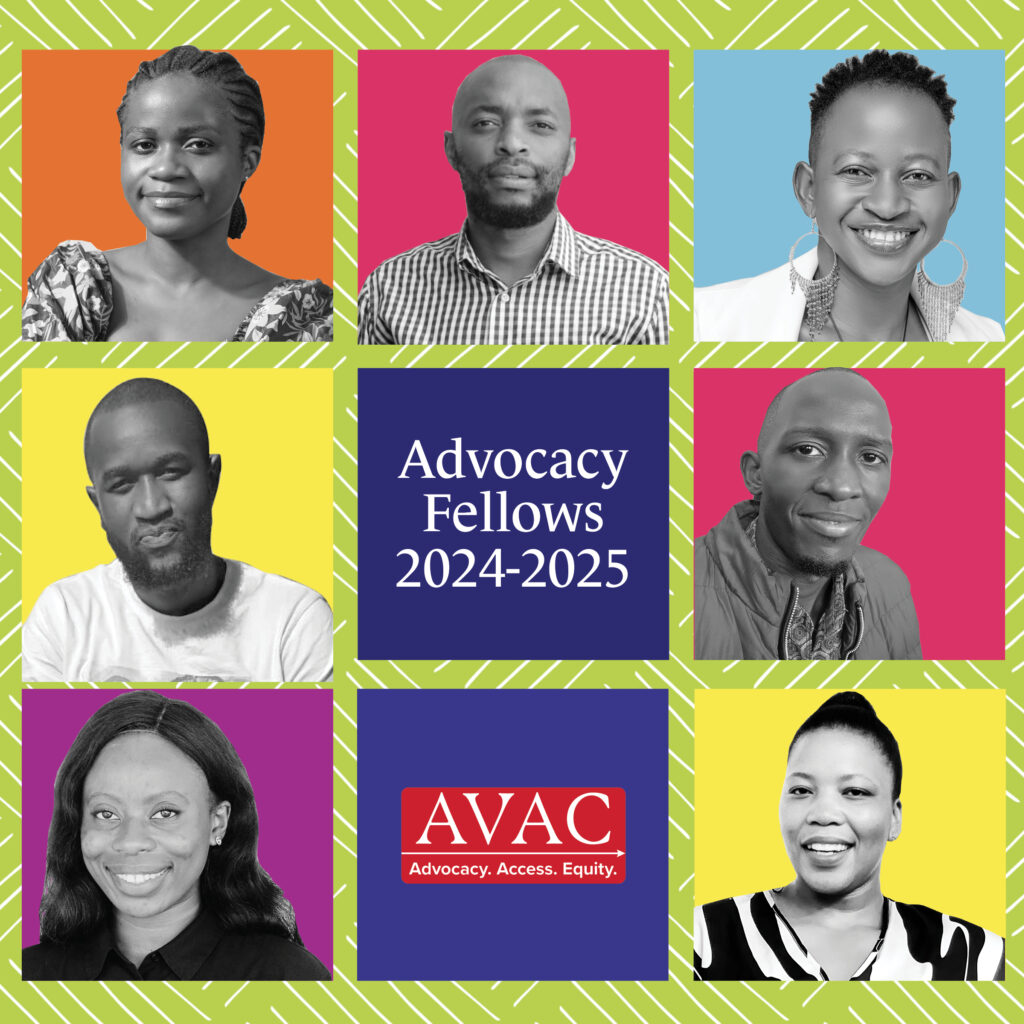
These Fellows were selected from a pool of 200+ applicants from seventeen countries to pursue evidence-based advocacy on a range of issues related to HIV prevention. The 2024/25 Advocacy Fellows and their host organizations include:
- Pamela Fuzile, Desmond Tutu Health Foundation, South Africa
- Samuel Anyula Gorigo, HOYMAS, Kenya
- Bahati Thomas Haule, DARE Organization, Tanzania
- Ezra Meme, We Rise and Prosper, Uganda
- Rhoda Msiska, Copper Rose Zambia, Zambia
- Elina Mwasinga, Coalition of Women Living with HIV and AIDS, Malawi
- Mokone Rantsoeleba, Phelisanang Bophelong HIV/AIDS Network, Lesotho
Congratulations to our new class of Fellows and thank you to all the applicants and their proposed host organizations for the time and effort put into the application process, and to the independent review committee of advocates, scientists and former Fellows and hosts who guided our decision-making.
About AVAC’s Advocacy Fellows Program
Achieving successful HIV prevention relies on programs and research shaped by communities and grounded by their needs and priorities. Skilled and informed community advocates drive this process. AVAC’s Advocacy Fellows Program expands and strengthens the capacity of civil society advocates and organizations to monitor, support and help shape HIV prevention research and rapid rollout of new effective interventions in low- and middle-income countries facing substantial HIV burdens.
The program provides intensive support to emerging and mid-career advocates to execute advocacy projects addressing locally identified gaps and priorities. Fellows receive comprehensive training, financial backing, and technical assistance to strategize and execute a targeted 18-month project hosted by an organization within their country.
In its 15-year history, nearly 100 advocates working with 70+ partner organizations across 15 countries have participated in the program. They have influenced policy, championed community perspectives, strengthened healthcare systems, demystified HIV prevention research, advocated for fairness and transparency on local, regional, and global scales and now lead many national and regional organizations. Discover more about the program’s impact here. And view video reflections from Alumni Fellows both here and here.
AVAC Response to Uganda’s Constitutional Court Ruling on the Anti-Homosexuality Act
AVAC is gravely concerned with the Constitutional Court of Uganda’s recent decision to uphold the core provisions of the Anti-Homosexuality Act of 2023 (AHA) that was signed into law nearly one year ago. AVAC stands in solidarity with the LGBTQIA+ community in Uganda, and globally, in calling out this dangerous law.
April Webinars!
This month we will host six webinars on a wide range of important issues, including choice in HIV prevention, PrEP in cisgender women, criminalization and HIV, syphilis in the US and DoxyPEP. Scroll down for what’s coming up later this week and later this month.
The More We Know: Evolving our understanding of PrEP for cisgender women
April 5, 9:00 – 10:30 am EST
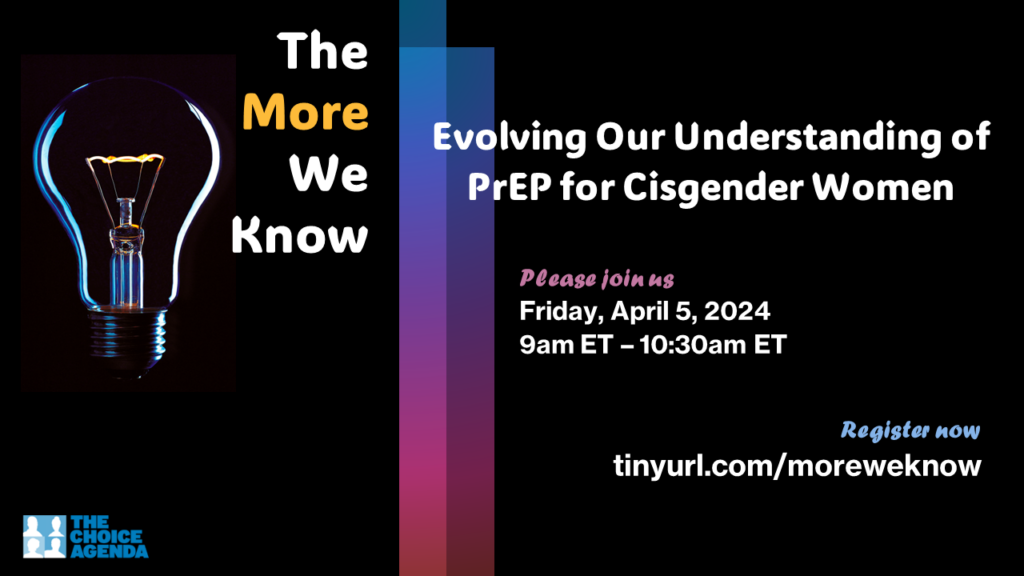
Science and real-world experience continue to demand a re-assessment of our collective understanding of the safety and effectiveness of PrEP options for women, including oral, vaginal ring, and injectable options. Join us, Jeanne Marrazzo of NIAID, Joyce Ng’ang’a of WACI Health and Raniyah Copeland of Equity & Impact Solutions for a conversation with The Choice Agenda.
Watching the Watcher: Intersections of surveillance and criminalization in HIV and reproductive health care
April 9, 10:00 – 11:30 am EST
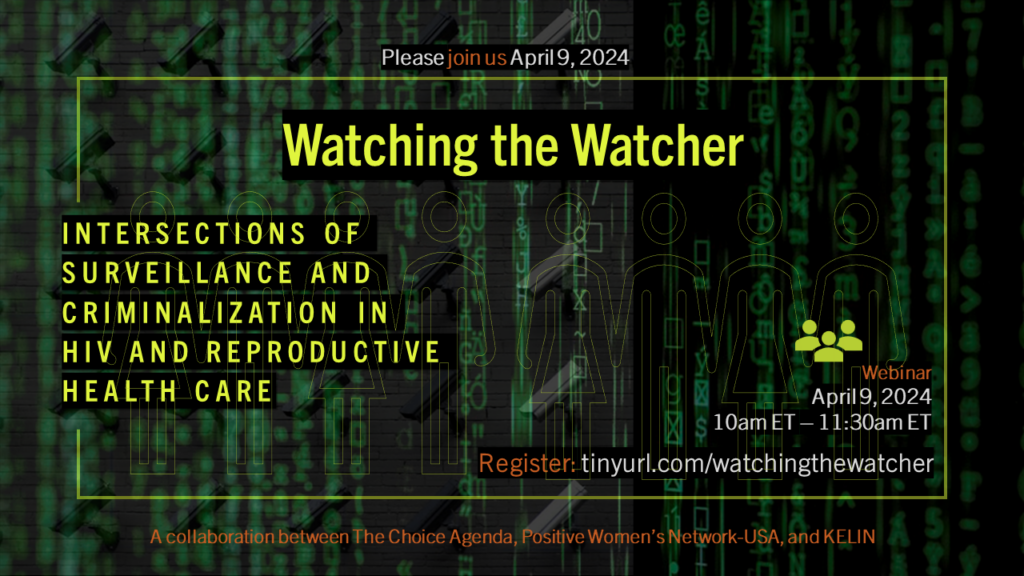
Positive Women’s Network-USA and The Choice Agenda invite you to join us for a webinar featuring leaders in digital technology, HIV advocacy, and abortion criminalization to examine the existential threat of our ongoing blurred boundaries between public health and policing.
STI Awareness Week is April 14 – 20!
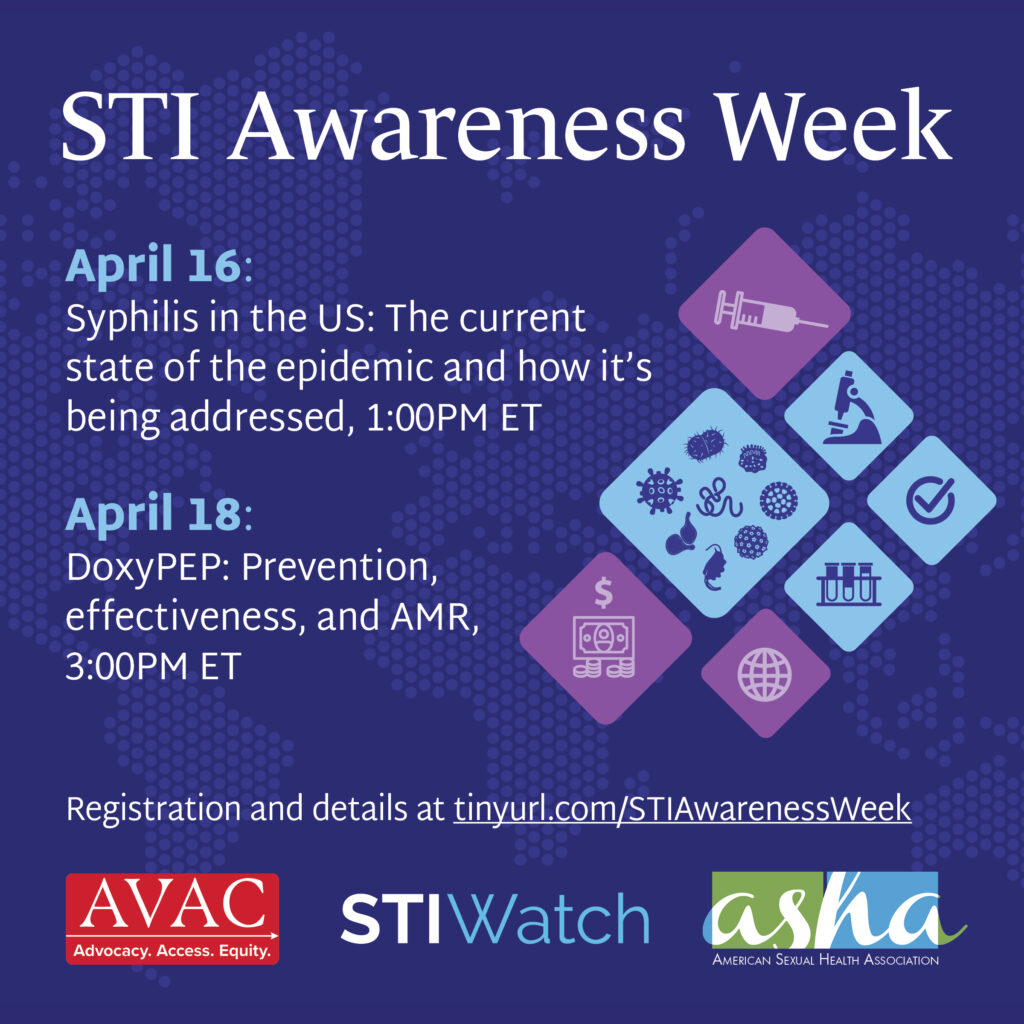
Join us for two webinars focused on syphilis and DoxyPEP. These webinars are intended for health care providers, civil society organizations, public health officials, and others working in the STI/HIV fields.
Discussing Early Results from the SEARCH Dynamic Choice Study
April 23, 10:00 – 11:30 am EST
Join AVAC and Professor Moses Kamya of Makerere University to find out why the early results of the SEARCH Dynamic Choice study were some of the most exciting to come out of CROI in 2024.
Conducted in Kenya and Uganda, the study offered oral PrEP, PEP or injectable cabotegravir to both men and women, and an option to switch products.
We Can’t End HIV in the United States Without Equitable PrEP Access: strategies for success
April 26, 1:00 – 2:30 pm EST
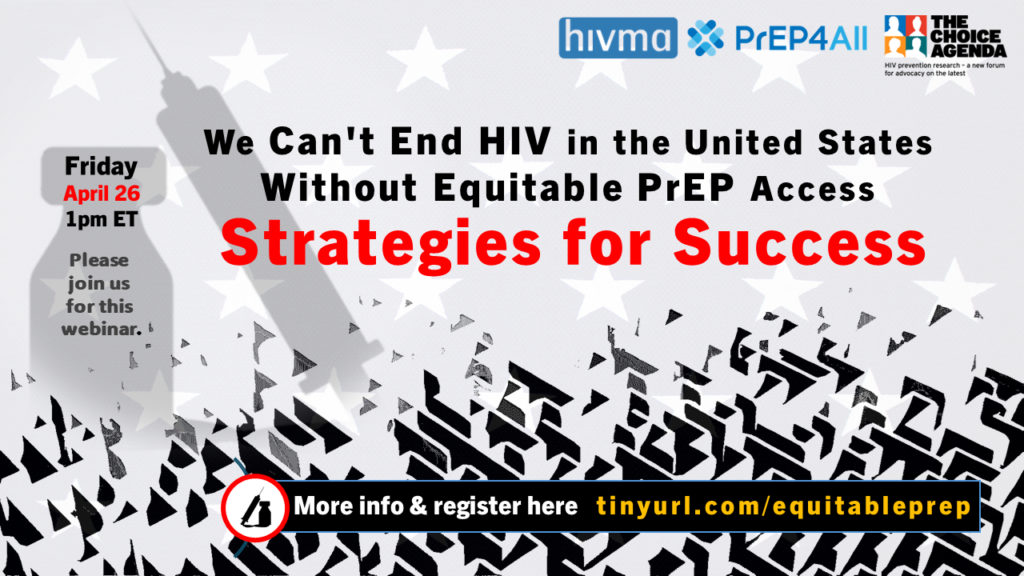
Join HIVMA, PrEP4All and The Choice Agenda, as we assess some of the key challenges to delivering PrEP in the United States equitably, including cost, the complexities of our health care system, and other factors that inhibit uptake amongst the most vulnerable communities. Strategies to address these challenges will be offered, with lots of time for QA, discussion and much-needed debate. Please join us!
Avac Event
We Can’t End HIV in the United States Without Equitable PrEP Access: Strategies for success
A collaboration between HIVMA, PrEP4All and The Choice Agenda, this webinar assessed some of the key challenges to delivering PrEP in the United States equitably, including cost, the complexities of our health care system, and other factors that inhibit uptake amongst the most vulnerable communities. Strategies to address these challenges were offered included a Q&A, discussion and much-needed debate.
Speakers:
• Dr. Lorraine Dean, Johns Hopkins University, Department of Epidemiology
• Dr. Rupa Patel, Division of HIV Prevention, National Center for HIV, Viral Hepatitis, STD, and TB Prevention, Centers for Disease Control and Prevention
• Dr. Patrick Sullivan, Rollins School of Public Health, Emory University
Moderator:
Dr. Greg Millet, amfAR
Recording / Slides / Resources
New Podcast Episode: Decolonizing Global Health
Dear Advocate,
Investing in the long-term success of African leadership is essential to breaking cycles that perpetuate inequity and that stall progress in the HIV response. In our newest episode of PxPulse, we explore why and how the decisions that shape global health must be made by those facing the greatest risks. As the world evaluates the pandemic response and debates on decolonizing global health gain momentum, equity in global health has never been more urgent.
For more than seven years, COMPASS Africa, a civil society coalition of 29 organizations working in three countries as well as regionally and globally, has used data-driven advocacy to improve the HIV response with high-impact campaigns. In January, the coalition underwent a major transition, with Pangaea Zimbabwe assuming the role of secretariat (previously held by AVAC), marking a historic milestone in the development of innovative models for power-sharing in coalition and an important step toward decolonizing global health. These changes in COMPASS come as other efforts, such as negotiations on the Pandemic Accord, are struggling to advance, uphold or safeguard equity.
Now is the time to test new models. In Decolonizing Global Health: Dr. Madhukar Pai and COMPASS Africa Tell Us Why and How, we explore what it takes to invest in equity and power sharing.
New Episode of PxPulse!
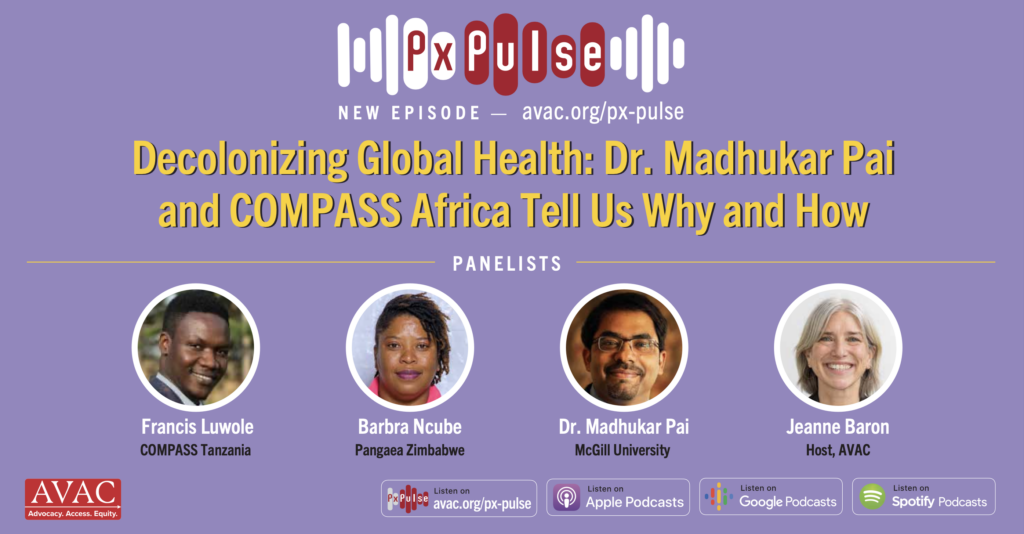
This episode of PxPulse features global health leader, Dr. Madhukar Pai, along with two leaders of COMPASS Africa, Francis Luwole and Barbra Ncube, talking about new models of power-sharing.
Listen now!
Tune in to Hear
- Dr. Madhu Pai, a Canada Research Chair of Epidemiology & Global Health at McGill University and Co-Editor-in-Chief of PLOS Global Health
- Francis Luwole is the Tanzania Country Coordinator for COMPASS Africa
- Barbra Ncube is Programs Quality Coordinator for Pangaea Zimbabwe and member of COMPASS Africa
Join the Conversation

To continue the conversation, register for the March 26 Choice Agenda webinar, Decolonizing Global Public Health: Exploring the how, from now, til as long as it takes.
Press Release
Funding for HIV Survives Extreme Cuts Proposed By House Republicans
Final FY24 Bill Includes Calls for HHS/CDC to Increase PrEP Access
21 March 2024 – PrEP4All, AVAC, HIVMA, and the PrEP in Black America coalition celebrate Congress’ decision to both fund domestic HIV programs at the same level as last year and to lift up calls for a National PrEP Program. The final 2024 Health and Human Services bill rejects extreme cuts to HIV funding proposed by House Republicans in July of last year. The organizations have led the charge on the #SaveHIVFunding campaign following efforts to eliminate $767M in critical funds to end HIV as an epidemic. We additionally thank House and Senate LHHS Appropriations Subcommittee leaders Senators Tammy Baldwin (D-WI) and Shelley Moore Capito (R-WV) and Representatives Robert Aderholt (R-AL) and Rosa DeLauro (D-CT) for working to ensure an effective and ultimately bipartisan outcome.
“Our movement for a National PrEP Program and to end HIV as an epidemic remains strong,” says PrEP4All Executive Director Jeremiah Johnson. “The final bill ultimately shows strong bipartisan support for HIV funding, including PrEP, and rejects the flawed effort by some House Republicans to zero out the Ending the HIV Epidemic Program. We created the #SaveHIVFunding campaign in collaboration with AVAC, HIVMA, and PrEP in Black America knowing that everyone in Congress needed to hear from community advocates in order to be successful in fighting these unnecessary deep cuts. Without this work and the concerted and brilliant efforts of so many HIV organizations within the Federal AIDS Policy Partnership, this win would not have been possible.”
The outcome means that a previous $25M increase going toward CDC’s efforts to improve equitable PrEP access will be preserved, which is critical as advocates continue to engage with CDC on ways to establish a foundation for a National PrEP Program using existing funds. Congress also included final report language directing CDC to increase access to PrEP and cited previous calls from the Senate to establish the “building blocks of a national program to increase awareness of PrEP, increase access to PrEP medication, [and] laboratory services…”
“This outcome is a win for Black communities across the nation who are disproportionately impacted by HIV. Making life-saving treatment and prevention a reality for Black Americans is a possibility because of our relentless advocacy work to #SaveHIVFunding,” says Raniyah Copeland, Founding member of the PrEP in Black America Coalition and Founder of Equity Impact Solutions.
“This has been a long process, and we are grateful to have an outcome that leaves us on firm footing to realize the vision of a National PrEP Program,” says Andrea Weddle of HIVMA. “However, the fight for FY25 is already upon us following this prolonged budget process; meaning that advocates will have to remain vigilant, fight to protect our existing funding, and continue to ensure a clear, immediate, and fully funded pathway toward equitable PrEP access.”
“This is very encouraging news for PrEP advocates, especially following the President’s reintroduction of his proposal for a National PrEP Program last week.” Explains John Meade, Senior Program Manager for Policy at AVAC . “Combined with HIV/AIDS housing advocates’ victory in achieving an FY24 funding increase, I am so proud of our movement and our ability to rally in the face of these threats.”
A National PrEP Program would be a cost effective means to achieve our national goal of Ending the HIV Epidemic by 2030. Pre-Exposure Prophylaxis (PrEP) is a 99% effective use of medication to prevent HIV. Unfortunately 64% of people who could benefit from PrEP do not have access to it. A new study shows that states with the highest PrEP coverage showed an annual percentage decrease in HIV diagnoses of 8% from 2012 – 2021. In contrast, states with low PrEP coverage increased 2% annually. A National PrEP Program will increase access among people who could benefit and address major disparities in access related to race, gender and geographic location. “In the current political environment, this Congressional action is especially noteworthy. But we must never confuse this progress with success; our fights for funding, equity and impact in treating and preventing this epidemic must continue, and funding and implementing a national PrEP program at scale and with urgency remains a huge priority,” said Mitchell Warren, Executive Director of AVAC.
Read the full press release here.
Decolonizing Global Health: Dr. Madhukar Pai and COMPASS Africa Tell Us Why and How
Produced and hosted by Jeanne Baron.
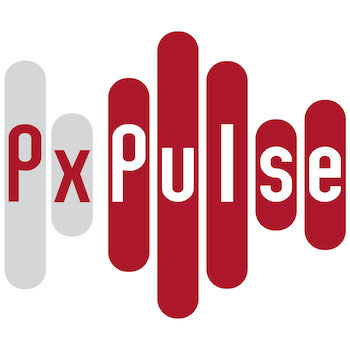
Investing in the long-term success of African leadership is essential to breaking cycles that perpetuate inequity and that stall progress in the HIV response. In January, The Coalition to build Momentum, Power, Activism, Strategy and Solidarity (COMPASS Africa) announced a major transition, with Pangaea Zimbabwe assuming the role of secretariat and the launch of a decentralized approach to governance across the coalition. These changes come as other efforts, such as negotiations on the Pandemic Accord, are struggling to advance, uphold or safeguard equity.
In this episode of PxPulse, we talk about why and how the decisions that shape global health must be made by those facing the greatest risks. As the world evaluates the pandemic response and debates on decolonizing global health gain momentum, equity in global health has never been more urgent.
This conversation features global health leader and critic, Dr. Madhukar Pai. And two members of the transnational coalition COMPASS Africa, Francis Luwole and Barbra Ncube, offer an up-close look at the coalition’s pioneering new model for power-sharing.
Tune in to Hear
- Dr. Pai, a Canada Research Chair in Epidemiology & Global Health at McGill University, Co-Editor-in-Chief of PLOS Global Health, and a frequent contributor in the media on equity in global health
- Francis Luwole, the Tanzania Country Coordinator for COMPASS Africa
- Barbra Ncube, Programs Quality Coordinator for Pangaea Zimbabwe and member of COMPASS Africa
Links
Advocacy Resources
- Towards Authentic Institutional Allyship by Global Health Funders, PLoS Global Public Health
- Will Global Health Survive its Decolonisation?, Lancet
- Addressing Power Asymmetries in Global Health: Imperatives in the wake of the COVID-19 pandemic, PLoS Medicine
- New COMPASS Governance Structure to Accelerate HIV Policy and Advocacy, AVAC
- The Way Forward in Decolonising Global Health, Lancet
- The Pandemic Treaty: Shameful and unjust, Lancet
- PLOS Global Public Health
- Decolonizing Global Public Health: Exploring the how, from now til as long as it takes,The Choice Agenda
Celebrating Rep. Barbara Lee and the Black Women Who Helped Shape the AIDS Movement
Following Black History Month and during Women’s History Month, it is important to honor Black women who have championed efforts in ending the epidemic and have led the ongoing fight in ensuring healthcare equity and justice for all. Someone who has worn multiple hats both as an advocate and as a US policymaker is no other than Representative Barbara Lee.
Throughout Rep. Lee’s close to three decades-long tenure as a member of the US House of Representatives, She has single-handedly created material change for people living with HIV and those at risk of infection, marginalization and stigmatization, both in the US and around the world. As AVAC’s executive director Mitchell Warren says, “when the definitive history of this pandemic is finally written, there is no greater shero in our collective story than Barbara Lee. The AIDS response wouldn’t be where it is today without her.”
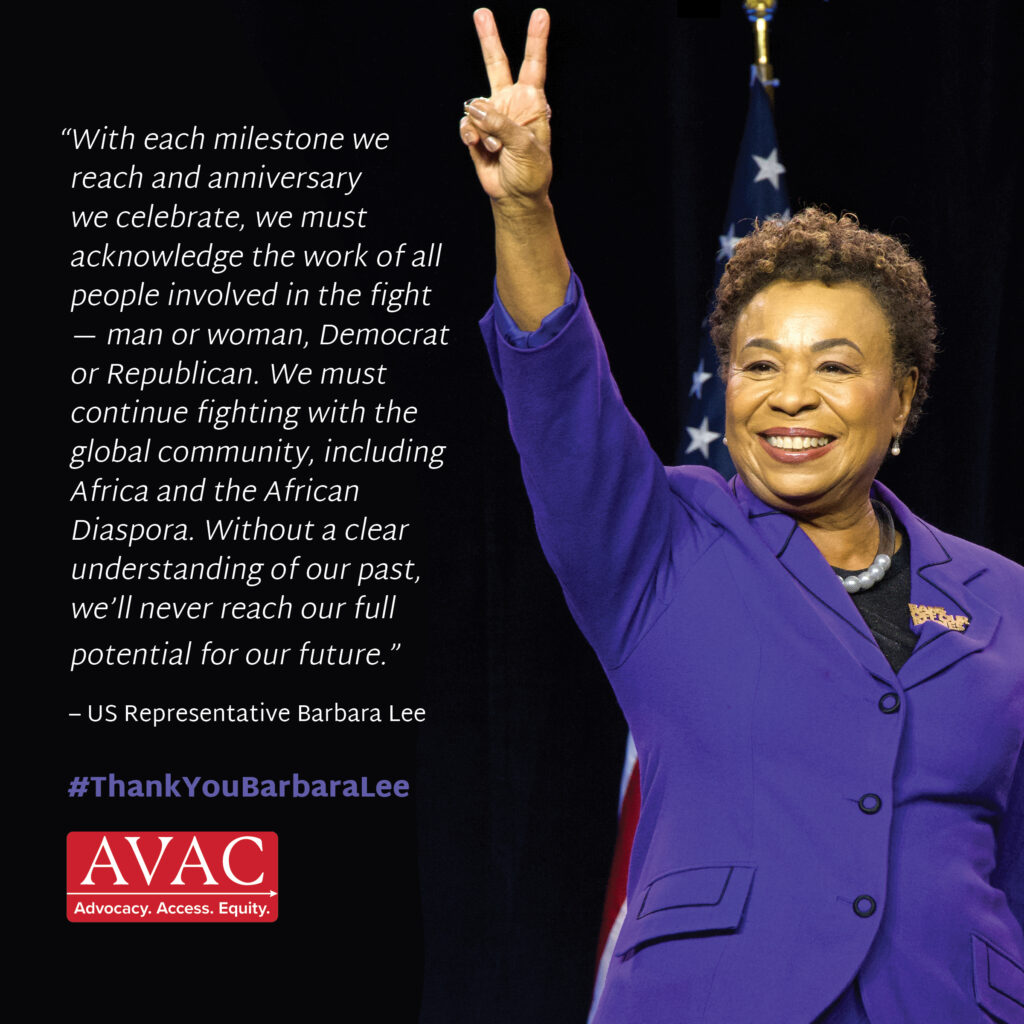
From co-authoring the Global AIDS and Tuberculosis Relief Act of 2000 and establishing the framework for the Global Fund to Fight AIDS, Tuberculosis and Malaria, to her instrumental work in drafting and passage of the President’s Emergency Plan for AIDS Relief (PEPFAR), to introducing legislation that would eventually lift the decades-old discriminatory HIV travel ban to the US, to her relentless efforts advocating to reform HIV/AIDS criminalization laws in the US, most recently with the Repeal Existing Policies that Encourage and Allow Legal (REPEAL) HIV Discrimination Act, Rep. Lee has walked the walk. She put grassroots-led efforts at the center of US and global policy in relation to those directly impacted by the HIV/AIDS epidemic.
Thank you, Rep. Barbara Lee, for the legacy you have built in forging an AIDS-free generation and for centering impacted communities throughout your work. We look forward to your efforts as co-chair and co-founder of the bipartisan and bicameral Congressional HIV/AIDS Caucus and a member of the full appropriations committee in continuing to support HIV/AIDS prevention, education, research and access to treatment while combatting stigma.
In addition to celebrating the tireless advocacy of Rep. Barbara Lee during Women’s History Month, it’s important to name the Black women who have changed the course of the AIDS epidemic including, but of course not limited to Raniyah Copeland, Dázon Dixon Diallo, Leisha McKinley-Beach, Yvette Raphael, and those we honor in our everyday actions, Hydeia Broadbent, Katrina Haslip, Dawn Smith, and the recently passed, Joan Gibbs.